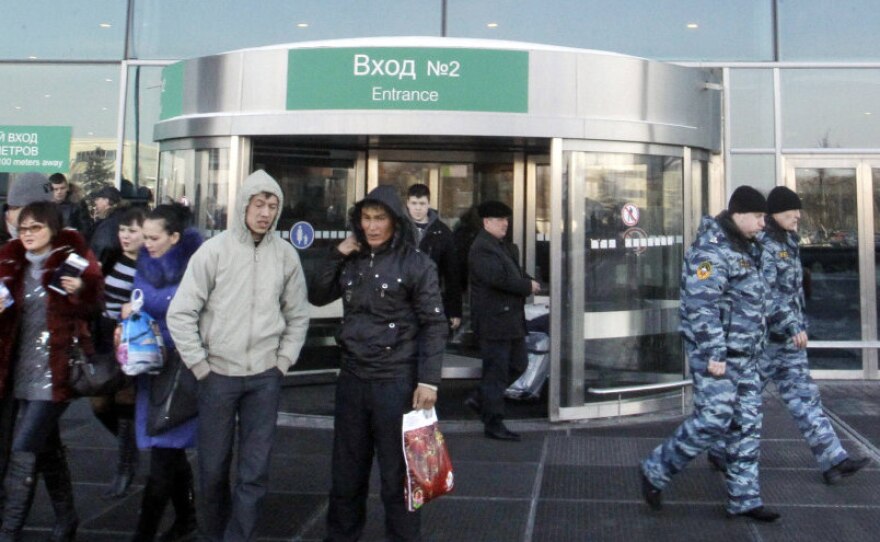Russian Prime Minister Vladimir Putin vowed "retribution is inevitable" for the bomb blast that killed at least 35 people at Russia's busiest airport, while President Dmitry Medvedev pointed the finger at airport officials for security lapses.
Putin has built much of his reputation on harsh statements, but he did not elaborate on what kind of retribution he had planned or against whom in his comments Tuesday carried by Russian news agencies.

Russian authorities believe a suicide attacker detonated the bomb that erupted Monday at Domodedevo Airport outside Moscow, wounding more than 100 people. Witnesses have said the attack was carried out by someone who brought a suitcase into the international arrivals hall, and one investigator told state media the remains of the presumed bomber were found.
But conflicting reports emerged Tuesday about how the attack was carried out. Some accounts, citing unnamed sources, said there were two bombers and that one of them was a woman.
Domodedovo has metal detectors at airport entrances, but they are used only on occasion, meaning someone could have walked into the main terminal Monday without being screened. The bombing exposed the unprotected underbelly of airport security — the international arrivals area, packed with families, taxi drivers and businesspeople, all of whom do not have to go through airport security. Few airports in the world control the entrances to such areas.
Medvedev described security at Domodedovo as being in "a state of anarchy" and insisted during a televised appearance that airport officials should have to explain "obvious violations" in their security plan and bear responsibility for any failures that contributed to the blast. He also said government security officials would be held accountable for any lapses found.
Airport management objected, saying transport police were responsible for the inspection of people coming into the international arrivals area, where the bombing took place.
The finger-pointing could undermine confidence in Russia's security ahead of Medvedev's high-profile appearance this week trying to attract investors at the World Economic Forum in Davos, Switzerland. Monday's attack also called into question Russia's ability to safely host major international events like the 2014 Winter Olympics in Sochi and the 2018 World Cup.
Suspicion for Monday's explosion is likely to fall on Islamist separatist insurgents from Chechnya or elsewhere in Russia's restive Caucasus region who have been battling Russian authority for more than 15 years.
Chechen insurgents have claimed responsibility for an array of attacks in Moscow and elsewhere in Russia, including a double suicide bombing on the capital's subway system in March 2010 that killed 40 people. They also have hit Domodedovo Airport before, with two suicide bombers slipping through its security in 2004 to kill 90 people.
Putin rose to power largely on his tough-against-terror image, including a famous vow that Chechen rebels would be hunted down and killed "in the outhouse." But despite launching the second Russia-Chechnya war and cracking down on suspected rebels, he was unable to wipe out the Chechen insurgency during his 2000-08 presidency.
The bombing at Domodedovo raises fears of retaliation against people of Caucasian descent, who often have darker complexions and face routine discrimination in Russia. Ethnic tensions were already high last month, when nationalists staged a series of riots in central Moscow, chanting slurs against Caucasians and yelling "Russia is for Russians!"
The Emergencies Ministry said the dead included one person each from Britain, Germany, Austria, Ukraine, Tajikistan, Kyrgyzstan and Uzbekistan; 16 were Russians, and the remaining 12 had not been identified. A further 110 people, including nine foreigners, were hospitalized.
The blast hit at 4:32 p.m. local time, when thousands of passengers and workers were in the terminal. They were sprayed with shrapnel containing screws and ball bearings to cause as many casualties as possible, and thick smoke engulfed the terminal.
"There was lots of blood, severed legs flying around," said Yelena Zatserkovnaya, a Lufthansa official, who said airport workers used baggage carts to wheel the wounded to ambulances.
Built in 1964, Domodedovo is located 26 miles southeast of Moscow and is the largest of the three major airports that serve the capital, handling more than 22 million people last year.
NPR's David Greene reported from Moscow for this story, which contains material from The Associated Press.
Copyright 2023 NPR. To see more, visit https://www.npr.org. 9(MDAzMjM2NDYzMDEyMzc1Njk5NjAxNzY3OQ001))






